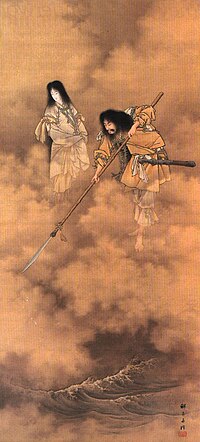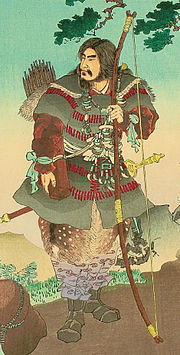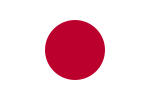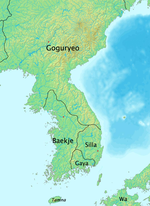The Nihon Shoki (日本書紀), sometimes translated as The Chronicles of Japan, is the second-oldest book of classical Japanese history. The book is also called...
21 KB (2,280 words) - 19:06, 5 October 2024
Izanagi (section In the Nihon Shoki)
as Izanagi-no-Kami (伊邪那岐神) and Izanagi-no-Mikoto (伊邪那岐命), while the Nihon Shoki (720 AD) refers to him as Izanagi-no-Mikoto, with the name written in...
16 KB (1,815 words) - 01:37, 27 October 2024
Jinmu-tennō) was the legendary first emperor of Japan according to the Nihon Shoki and Kojiki. His ascension is traditionally dated as 660 BC. In Japanese...
30 KB (3,978 words) - 18:08, 7 November 2024
portrayed in Japan's earliest literary texts, the Kojiki (c. 712 CE) and the Nihon Shoki (720 CE), as the ruler (or one of the rulers) of the heavenly realm Takamagahara...
79 KB (8,428 words) - 21:31, 9 November 2024
Japanese mythological cycle recorded in the Kojiki (c. 712 CE) and the Nihon Shoki (720 CE). One of the gazetteer reports (Fudoki) commissioned by the imperial...
88 KB (10,695 words) - 09:19, 26 October 2024
Urashima Tarō (section Nihon Shoki)
literature dating to the 8th century, such as the Fudoki for Tango Province, Nihon Shoki, and the Man'yōshū. During the Muromachi to Edo periods, versions of...
70 KB (8,031 words) - 19:23, 3 October 2024
Japanese myths, as they are recognized today, are the Kojiki and the Nihon Shoki. The Kojiki, or "Record of Ancient Matters," is the oldest surviving...
28 KB (3,643 words) - 07:26, 29 October 2024
beings Nakajima Ki-44 Shōki, a single-engine fighter aircraft used by the Imperial Japanese Army Air Force in World War II Nihon Shoki, sometimes translated...
1 KB (175 words) - 22:01, 10 November 2024
two books are the Kojiki and the Nihon Shoki. collectively called the Kiki (記紀) Kojiki One of the Kiki. Nihon Shoki One of the Kiki, first of the Rikkokushi...
19 KB (2,249 words) - 14:05, 9 October 2024
Baekje language (section Nihon Shoki)
in this passage and some Baekje words cited in the Japanese history Nihon Shoki (720), many scholars, beginning with Kōno Rokurō and later Kim Bang-han...
20 KB (1,549 words) - 20:12, 11 November 2024
"Book II", Nihon Shoki, translated by Aston, William George, Pub. for the Society by K. Paul, Trench, Trübner, 1896 "Book III", Nihon Shoki, translated...
50 KB (6,083 words) - 01:54, 1 November 2024
Futsunushi (section Nihon Shoki)
Izanagi and Izanami's begetting of various gods (kamiumi) cited in the Nihon Shoki states that when Izanagi killed the newborn fire god Kagutsuchi (whose...
25 KB (2,665 words) - 04:48, 23 October 2024
literary work in Japan. The myths contained in the Kojiki as well as the Nihon Shoki (日本書紀) are part of the inspiration behind many practices and unified...
50 KB (6,255 words) - 18:38, 30 July 2024
Japanese language (redirect from Nihon go)
秦韓六國諸軍事、安東大將軍、倭國王。至齊建元中,及梁武帝時,并來朝貢。 Nihon shoki Chapter 30:持統五年 九月己巳朔壬申。賜音博士大唐続守言。薩弘恪。書博士百済末士善信、銀人二十両。 Nihon shoki Chapter 30:持統六年 十二月辛酉朔甲戌。賜音博士続守言。薩弘恪水田人四町...
90 KB (10,160 words) - 08:09, 31 October 2024
Himetataraisuzu-hime (媛蹈鞴五十鈴媛) is a Japanese goddess, a mythological figure in the Nihon Shoki (Chronicles of Japan), the first empress of Japan, and the first wife...
32 KB (5,359 words) - 20:19, 21 September 2024
Yamato no Kuni no Miyatsuko (section Nihon Shoki)
Sengoku Daimyo. April 2022. Retrieved 2023-05-04. See the references under Nihon Shoki for an extended bibliography Aston, William George (1896). Nihongi: Chronicles...
10 KB (940 words) - 15:44, 24 September 2024
Mikeiri no Mikoto (section Nihon Shoki)
He was the older brother of Jimmu. While playing a minor role in the Nihon Shoki, he has a prominent local tradition at Takachiho Shrine of which he is...
5 KB (1,151 words) - 01:50, 23 May 2024
tradition regarding kami worship was recorded in the 8th-century Kojiki and Nihon Shoki. In ensuing centuries, shinbutsu-shūgō was adopted by Japan's Imperial...
124 KB (15,718 words) - 14:07, 9 November 2024
Yamato Okunitama (section Nihon Shoki)
Ōmononushi, and Kotoshironushi.: 343 Yamato Okunitama appears in the Nihon Shoki, as well as the Kogo Shūi. He was formerly worshiped in the imperial...
14 KB (1,509 words) - 22:22, 27 October 2024
Kokki in 620 CE. The earliest extant work is the Kojiki of 712. The Nihon Shoki followed by 720. These two works formed the base of a history of the...
28 KB (3,398 words) - 17:59, 3 January 2024
deity (kami) in Japanese mythology, portrayed in the Kojiki and the Nihon Shoki as the first or one of the first deities who manifested when heaven and...
23 KB (2,585 words) - 15:14, 20 September 2024
first reliable historical mention of the sword is in the Nihon Shoki. Although the Nihon Shoki also contains mythological stories that are not considered...
16 KB (1,971 words) - 09:46, 12 November 2024
works compiled in Japan are the historical chronicles Kojiki (712) and Nihon Shoki (720). Other early Japanese works from the Nara period include biographies...
130 KB (7,810 words) - 22:01, 8 October 2024
Kuninotokotachi-no-Kami, in Kojiki) (国常立尊, Kuninotokotachi-no-Mikoto, in Nihon Shoki (no-Mikoto here being an honorific of divinity) or Kuni-toko-tachi is...
3 KB (300 words) - 17:34, 19 September 2024
diplomatic missions from Baekje reached Japan around 367 (According to the Nihon Shoki: 247). King Geunchogo (346–375) expanded Baekje's territory to the north...
48 KB (5,288 words) - 04:20, 11 November 2024
the southern Korean Peninsula influenced each other. According to the Nihon Shoki, Buddhism and the Chinese writing system were introduced near the end...
46 KB (5,478 words) - 20:21, 1 November 2024
both as Izanami-no-Kami (伊弉冉神) and Izanami-no-Mikoto (伊邪那美命), while the Nihon Shoki (720 AD) refers to her as Izanami-no-Mikoto, with the name written in...
15 KB (1,597 words) - 01:38, 27 October 2024
gift from the king of Baekje to a Yamato ruler. It is mentioned in the Nihon Shoki in the fifty-second year of the reign of the semi-mythical Empress Jingū...
24 KB (3,353 words) - 00:29, 3 September 2024
becoming modern Japanese tsuki) and yomi (読み, "reading, counting"). The Nihon Shoki mentions this name spelled as Tsukuyumi (月弓, "moon bow"), but this yumi...
5 KB (560 words) - 00:25, 2 September 2024




















